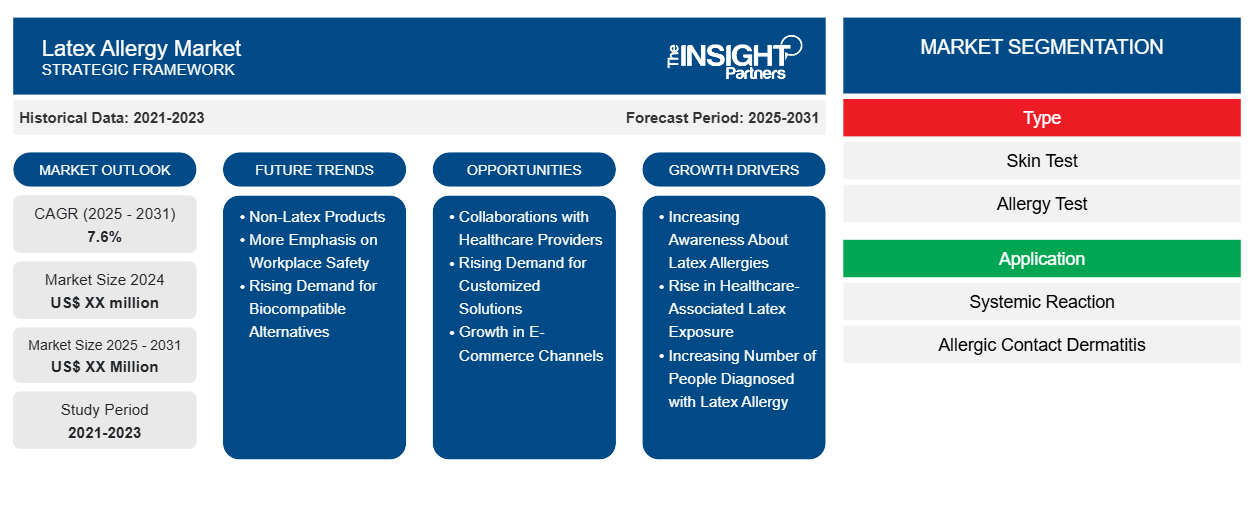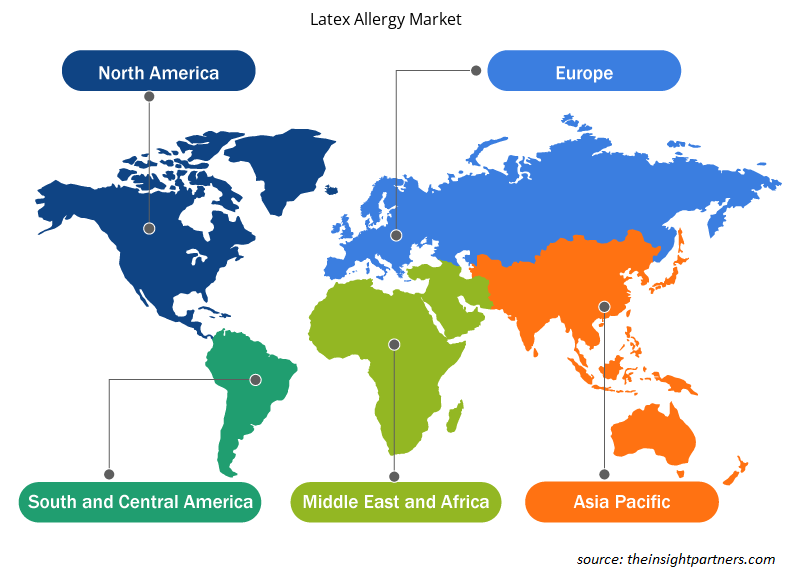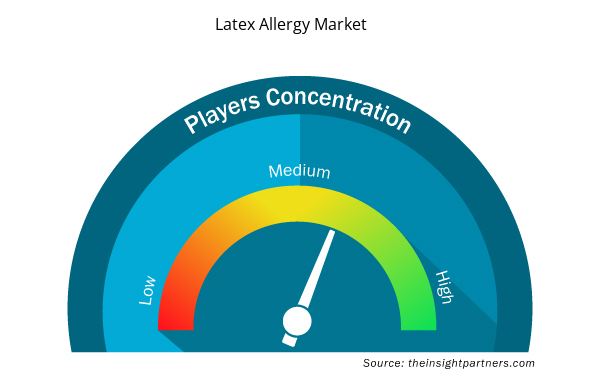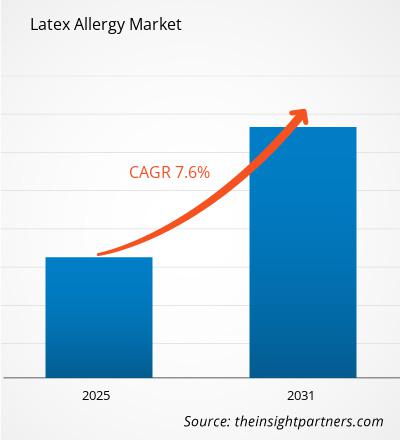The Latex Allergy Market is expected to register a CAGR of 7.6% from 2025 to 2031, with a market size expanding from US$ XX million in 2024 to US$ XX Million by 2031.
The Latex Allergy Market report covers analysis by Type (Skin Test, Allergy Test); Application (Systemic Reaction, Allergic Contact Dermatitis, Others), and Geography (North America, Europe, Asia Pacific, and South and Central America). The global analysis is further broken-down at regional level and major countries. The report Offers the Value in US$ for the above analysis and segments.
Purpose of the Report
The report Latex Allergy Market by The Insight Partners aims to describe the present landscape and future growth, top driving factors, challenges, and opportunities. This will provide insights to various business stakeholders, such as:
- Technology Providers/Manufacturers: To understand the evolving market dynamics and know the potential growth opportunities, enabling them to make informed strategic decisions.
- Investors: To conduct a comprehensive trend analysis regarding the market growth rate, market financial projections, and opportunities that exist across the value chain.
- Regulatory bodies: To regulate policies and police activities in the market with the aim of minimizing abuse, preserving investor trust and confidence, and upholding the integrity and stability of the market.
Latex Allergy Market Segmentation
Type
- Skin Test
- Allergy Test
Application
- Systemic Reaction
- Allergic Contact Dermatitis
Customize This Report To Suit Your Requirement
You will get customization on any report - free of charge - including parts of this report, or country-level analysis, Excel Data pack, as well as avail great offers and discounts for start-ups & universities
Latex Allergy Market: Strategic Insights

- Get Top Key Market Trends of this report.This FREE sample will include data analysis, ranging from market trends to estimates and forecasts.
Latex Allergy Market Growth Drivers
- Increasing Awareness About Latex Allergies: Moreover, public awareness campaigns along with efforts made by healthcare organizations, like the American Latex Allergy Association, educate people about the risks associated with latex exposure. These programs help people to identify symptoms, such as rashes, hives, or severe anaphylactic reactions, and encourage them to use safer alternatives. In March 2023, a major milestone for the company's medical devices unit was marked when Johnson & Johnson launched its line of latex-free bandages in March 2023. This product line seeks to reduce allergic reactions since it considers the problems that latex allergies can provide, especially in sensitive settings like hospitals and clinics. This program enhances patient safety but also positions Johnson & Johnson at the forefront in the field of allergy care. Widespread distribution of educational materials in hospitals, schools, and workplaces amplifies such awareness and pushes the demand for hypoallergenic solutions.
- Rise in Healthcare-Associated Latex Exposure: Healthcare workers frequently use latex-based gloves, catheters, and other devices, leading to repeated exposure and an increased risk of sensitization. Latex allergy is a significant occupational hazard in the healthcare industry, prompting a shift to nitrile or synthetic gloves and other non-latex alternatives. Additionally, patient safety protocols now prioritize latex-free environments, especially in operating rooms and pediatric care units.
- Increasing Number of People Diagnosed with Latex Allergy: Market demand is boosted by the rising number of cases of latex allergies among individuals who use latex products daily or have comorbid diseases, such as spina bifida. Some research studies predict that 8–17% of healthcare professionals and 1–6% of the total population may have a latex allergy. In April 2023, the world's leading protective solution company, Ansell Ltd., is to launch an entirely latex-free new series of synthetic surgical gloves, in April 2022. Manufactured without any residue of latex content, these products are a solution for health professionals and also patients who carry a latex allergy. The innovation reflects an endeavor by the company to serve its users as safely as possible as well as provide a solution to addressing the problem of latex allergy head-on. As this disease becomes increasingly widespread, safer products are needed especially in high-risk industries such as hospitals, food services, and manufacturing.
Latex Allergy Market Future Trends
- Non-Latex Products: There is an increasing demand for non-latex products in all sectors, influenced by regulatory compliance, increased awareness, and institutional policies. In hospitals and food processing plants, nitrile gloves and latex-free adhesives are now being used to decrease allergen exposure. This has also been reflected in consumer products such as balloons, mattresses, and rubber bands where latex-free varieties have gained popularity.
- More Emphasis on Workplace Safety: Occupational safety standards emphasize the reduction of allergen exposure to workers. In manufacturing, hospitals, and cleaning services, employers are becoming latex-free to afford their employees the possibility of a safe environment and to avoid costly claims related to medical expenses or lawsuits. It calls for a drive in the adoption of alternatives and supplier procurement practices.
- Rising Demand for Biocompatible Alternatives: Consumers are increasingly prioritizing products that are both hypoallergenic and environmentally friendly. Biocompatible materials, derived from plant-based or synthetic sources, address these concerns. For example, gloves made from biodegradable polymers offer a sustainable solution without compromising on safety, aligning with broader trends toward eco-consciousness.
Latex Allergy Market Opportunities
- Collaborations with Healthcare Providers: Partnerships between manufacturers and healthcare institutions can accelerate the adoption of non-latex solutions. Hospitals often conduct pilot programs to test new products, and successful trials lead to bulk procurement. Collaborative efforts also involve co-developing specialized products for niche requirements, such as latex-free surgical instruments.
- Rising Demand for Customized Solutions: Diverse industries require tailored non-latex solutions based on specific needs. For example, food service workers may need textured gloves for better grip, while healthcare providers prioritize sterilized and powder-free options. Manufacturers offering customization gain a competitive edge by addressing these unique requirements.
- Growth in E-Commerce Channels: The rise of online retail platforms facilitates easy access to non-latex products for consumers and businesses alike. E-commerce channels enable manufacturers to reach a broader audience, provide detailed product information, and implement targeted marketing strategies. Bulk purchasing options and subscription models further drive online sales.
Latex Allergy Market Regional Insights
The regional trends and factors influencing the Latex Allergy Market throughout the forecast period have been thoroughly explained by the analysts at Insight Partners. This section also discusses Latex Allergy Market segments and geography across North America, Europe, Asia Pacific, Middle East and Africa, and South and Central America.

- Get the Regional Specific Data for Latex Allergy Market
Latex Allergy Market Report Scope
| Report Attribute | Details |
|---|---|
| Market size in 2024 | US$ XX million |
| Market Size by 2031 | US$ XX Million |
| Global CAGR (2025 - 2031) | 7.6% |
| Historical Data | 2021-2023 |
| Forecast period | 2025-2031 |
| Segments Covered |
By Type
|
| Regions and Countries Covered | North America
|
| Market leaders and key company profiles |
Latex Allergy Market Players Density: Understanding Its Impact on Business Dynamics
The Latex Allergy Market market is growing rapidly, driven by increasing end-user demand due to factors such as evolving consumer preferences, technological advancements, and greater awareness of the product's benefits. As demand rises, businesses are expanding their offerings, innovating to meet consumer needs, and capitalizing on emerging trends, which further fuels market growth.
Market players density refers to the distribution of firms or companies operating within a particular market or industry. It indicates how many competitors (market players) are present in a given market space relative to its size or total market value.
Major Companies operating in the Latex Allergy Market are:
- GlaxoSmithKline plc.
- Johnson & Johnson Services, Inc.
- Merck & Co., Inc.
- Nektar
- Novartis AG
- Sanofi
Disclaimer: The companies listed above are not ranked in any particular order.

- Get the Latex Allergy Market top key players overview
Key Selling Points
- Comprehensive Coverage: The report comprehensively covers the analysis of products, services, types, and end users of the Latex Allergy Market, providing a holistic landscape.
- Expert Analysis: The report is compiled based on the in-depth understanding of industry experts and analysts.
- Up-to-date Information: The report assures business relevance due to its coverage of recent information and data trends.
- Customization Options: This report can be customized to cater to specific client requirements and suit the business strategies aptly.
The research report on the Latex Allergy Market can, therefore, help spearhead the trail of decoding and understanding the industry scenario and growth prospects. Although there can be a few valid concerns, the overall benefits of this report tend to outweigh the disadvantages.
- Historical Analysis (2 Years), Base Year, Forecast (7 Years) with CAGR
- PEST and SWOT Analysis
- Market Size Value / Volume - Global, Regional, Country
- Industry and Competitive Landscape
- Excel Dataset


- UV Curing System Market
- Latent TB Detection Market
- Emergency Department Information System (EDIS) Market
- Smart Water Metering Market
- Aircraft MRO Market
- HVAC Sensors Market
- Integrated Platform Management System Market
- Bio-Based Ethylene Market
- Batter and Breader Premixes Market
- Nitrogenous Fertilizer Market

Report Coverage
Revenue forecast, Company Analysis, Industry landscape, Growth factors, and Trends

Segment Covered
This text is related
to segments covered.

Regional Scope
North America, Europe, Asia Pacific, Middle East & Africa, South & Central America

Country Scope
This text is related
to country scope.
Frequently Asked Questions
The major factors driving the Latex Allergy Market are Increasing Awareness About Latex Allergies, Rise in Healthcare-Associated Latex Exposure, and Increasing Number of People Diagnosed with Latex Allergy
The key future trends of the market are Non-Latex Products, More Emphasis on Workplace Safety, and Rising Demand for Biocompatible Alternatives
The leading players operating in the Latex Allergy Market include GlaxoSmithKline plc., Johnson & Johnson Services, Inc., Merck & Co., Inc., Nektar, Novartis AG, Sanofi, 3MP, Alcon Vision LLC., Rocky Mountain Diagnostics.
The report can be delivered in PDF/PPT format; we can also share excel dataset based on the request.
Some of the customization options available based on the request are an additional 3–5 company profiles and country-specific analysis of 3–5 countries of your choice. Customizations are to be requested/discussed before making final order confirmation, as our team would review the same and check the feasibility.
Trends and growth analysis reports related to Life Sciences : READ MORE..
The List of Companies
1. GlaxoSmithKline plc.
2. Johnson & Johnson Services, Inc.
3. Merck & Co., Inc.
4. Nektar
5. Novartis AG
6. Sanofi
7. 3MP
8. Alcon Vision LLC.
9. Rocky Mountain Diagnostics
10. Allerayde UK

 Get Free Sample For
Get Free Sample For